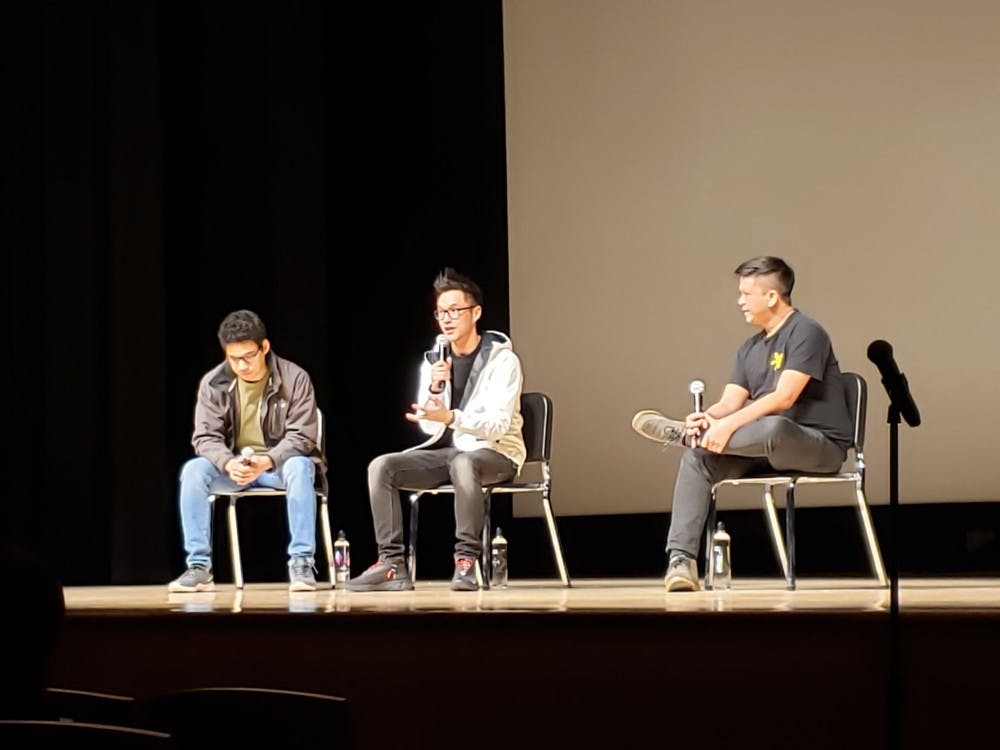“I haven’t seen this many Asians in one room other than a computer science class,” a friend next to me said as we awaited the kickoff of Asian/Pacific American Heritage Month. To be honest, I hadn’t ever even heard of it nor Wong Fu Productions until I went to the opening ceremony.
Initially, as I was walking to Shaffer in the pouring rain, I regretted volunteering to go. My whole perspective changed as I walked out. It was still raining, but this time I didn’t really mind.
The kickoff of Asian/Pacific American Heritage Month took place on Friday, March 1 with guest speakers Wesley Chan, Taylor Chan and Chris Yang from the team behind Wong Fu Productions.
Wong Fu Productions is an independent digital production company that was founded in 2003.
According to its website, its work has been recognized by various renowned media outlets like CNN, NPR and even the White House for its “striking quality and emotional depth, as well as its authentic representation of Asian Americans.”
And I’d say the content is pretty funny too. We were shown three episodes of a five part series, Yappie — Wong Fu Production’s latest project that deals with the complexity of being Asian American in the States.
The brothers’ initial plan was to pitch Yappie to a production house for a pilot episode. After pitching the series, the brothers were asked to come up with a hook.
They wondered, “Why can’t the Asian-American experience be interesting enough to be the hook?” So with combined interests in not wanting Yappie to become a hard-to-access production that they would simply profit from, they decided to make it on their own and released the series on YouTube.
In the short film, the main character, Andrew, struggles with the fact that he is a mediocre Asian in his 20s with a nice car, nice house and a secure office job.
In other words, he always just played it “safe.” He didn’t even known that Asian/Pacific American Heritage Month existed until his white boss told him to prepare an office party in celebration of the month.
After talking to an African-American co-worker who planned the Black History Month party, he realizes that he was given a significantly lower budget.
Puzzled and slightly indignant, he asks his boss why and she tells him that different Asian communities like the Korean American Engineers Group and the South Asian Coalition had already asked for separate budgets.
That is when he realizes the fragmented nature of the Asian community (if he could even call it a community); in some sense, he found it inevitable, as Asians are a part of a broad race with people of various nationalities, which gives them different histories, cultures and heritages.
Despite these differences, Andrew attempts to bring everyone together to celebrate Asian/Pacific American Heritage Month as a whole.
While I am not Asian American myself (I’m an Asian international student), a lot of what the film and Wong Fu Productions had to say resonated with me. It is very true that a lot of tension and competition exist within different Asian communities.
Asian countries stand on completely different sides on topics ranging from which country has the best sports teams to historical accuracy of certain events in history.
There is even competition in the nitty-gritty, as Wesley Chan said, for example, between which country has “the best noodles.” He added that we should approach this infighting with the mindset that “we have an all-star team because we cover the most ground.” We shouldn’t compare each other’s cultures and “fight amongst ourselves.”
During the question and answer session, a student asked for career advice for young people who have strict Asian parents. As I looked to the audience, I saw many heads nodding slightly, as if they were picturing their own helicopter parents back home.
That’s when I realized we Asians have more in common than we initially may think.
While there are distinct differences among each Asian country, we indeed should strive to support each other and bring each other up. Despite the fact that most actors and actresses weren’t Korean like me, I still remember being thrilled when I read an article about increased Asian representation in this year’s Oscars.
“Crazy Rich Asians doesn’t represent the whole vast majority, but we come together and celebrate each other’s successes,” Taylor Chan said.
Crazy Rich Asians was a groundbreaking rom-com film that was the first Hollywood movie to have an all-Asian cast in 25 years.
Many Asian Americans were incredibly proud of what their community members had achieved. The successes of Filipinos, Chinese, Japanese and all other Asian groups are not just attributable to those isolated countries. We are much stronger together, and Yappie is an excellent first step toward showing the truth of that fact.





